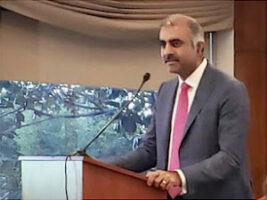Extracts and synthesis from Abraham Eraly’s book, “The First Spring – The Golden Age of India” – a study of ancient Indian civilization
Notes on Hindu Philosophy (Part 1)
While Hinduism has many different schools of philosophy and belief systems, there are some common characteristics across them. Have tried to synthesise a few of these common characteristics below:
- Acceptance of diversity
- Hinduism is an indefinable, polymorphic religion, and an agglomeration of innumerable sects, deities, rituals and conflicting beliefs. Nearly anything that can be said about it can be contradicted by something else that is equally true about it, and nothing whatever that is said about it can be entirely true or entirely false. Hinduism has no inviolable core beliefs, no single primary scripture, no supreme god or gods to whom all Hindus have to be devoted, no common mode of worship, and no common value system. The only defining characteristic of Hinduism is, in fact, its all-inclusiveness.
- Hinduism abhors absolutes. All values are relative in it. The distinctions between good and evil, right and wrong, noble and ignoble, pleasant and unpleasant, are all purely matters of perspective, and not inherent in the objects, states or deeds themselves.
- Hinduism is a pliable and inclusive religion, which could assume any form to suit any local culture, and absorb any number of diverse cults. And this, in the long run, proved to be a far more effective means of religious expansion that the missionary activities of Buddhism and Jainism. Hinduism spread not so much by converting other sectaries to its beliefs and practices, as by absorbing into itself the beliefs and practices of other sects.
- Hinduism is the most tolerant of all the great religions of the world, tolerant of its own numerous divergent sects as well as other religions. “If any worshipper do reverence with faith to any god whatever, he will receive boons”, assures Krishna in Bhagvad Gita. “As all streams flow into the ocean, so the worship offered to any god is received by Brahman”. “Whosoever honors his own sect while condemning the sects of others in reality inflicts the severest injury on his own sect.”
- The most striking common characteristic of all the Indian philosophical schools is that none of them, neither the orthodox nor the heterodox schools, pays any serious attention to the concept of god. Upanishadic philosophers discarded the concept of gods and replaced it with the concept of Brahman, the impersonal and all-pervasive entity that is identical with the universe and is the embodiment of all the potential of the universe. The universe, they held, is auto-dynamic; it has no creator or controller, but evolved through the spontaneous unfolding of its inherent nature. The whole universe, including individual selves, is fundamentally identical with Brahman. There is nothing whatever in the universe other than Brahman.
- Hinduism, unlike the Middle Eastern religions, does not see the cosmic process as a struggle between good and evil. There is no Satan in Puranic Hinduism, no embodiment of absolute evil. The Hindu view holds that there can be no eternal punishment or reward for what one does during one’s all-too-brief sojourn on earth. The reward and punishment for finite deeds should also be finite. Besides, how can heaven and hell be eternal when nothing in the universe, indeed the universe itself, is eternal, but would perish at the end of each cosmic cycle before re-evolving. Puranic Hinduism gives greater attention to karma and its transmigratory consequences than to heaven and hell. Karma and transmigration are, in fact, the only two universally held doctrines of Hinduism.
- Karma theory says that everything that happens to a man in this life is the consequence of his previous actions, in his present life as well in his previous lives. The karma theory, establishing the causal link between action and its consequence, is a perfectly rational and plausible explanation of everything that happens in the world. It sees world as a strictly rational, ethically determined cosmos.
- In the Indian view, individual life does not begin with birth. Or end with death. Life is merely a stage in samsara the eternal cycle of birth and death and rebirth, and transmigration from one life form to another and yet another, ceaselessly. The kind of rebirth that one has – as what creature; and if man, of which caste and in which environment-and what happens to one in that life, are all determined by one’s accumulated karma of all the previous lives.
- A third tenet that is widely held by Hindus is that moksha – salvation, escape from the cycle of transmigration-is the ultimate goals of life. Karma and moksha are, however, antithetical concepts. How can there be escape from transmigration if the cycle of samsara is karma-driven and eternal.
- Pervasive Indian belief that to understand the world (and oneself) we should look inward, not outward, since the microcosm is, in essence, identical with the macrocosm, and the knowledge of the whole universe of latent in each of us, indeed, in each molecule. Therefore, meditation is the primary activity of the devout in all Indian religions.
- Hinduism is unique among the major religions of the world in having no single deity whom all Hindus worship. Idol worship is not the worship of the idol, but of the deity it symbolizes. The idol is both an aid for the worshipper to focus his devotion, and also a means for him to absorb the divine effulgence emanating from the image.



